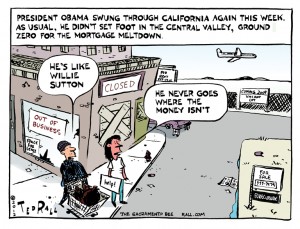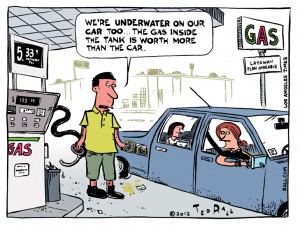Why It’s OK for Disgusted Liberals Not to Vote for Obama
Here we go again. Like Charlie Brown considering Lucy’s offer to hold the football so he can kick it–and Lucy’s promises not to pull it away at the last second, as she’s done every time in the past–lefties are being urged to set aside their disgust over the last four years and vote Democratic.
At least Lucy respected Charlie Brown enough to lie to him. President Obama isn’t even bothering to tell disappointed progressive voters that things will be different this time. At last night’s second presidential debate, for example, he promised to create jobs years in the future–not now, when we need them.
Despite my well-documented doubts, I voted for Obama in 2008. Not this time.
“If you don’t vote for Obama, you’re letting Romney win.” (So many friends, colleagues, family members, correspondents, bloggers and random whoevers have told me that that it hardly seems fair to single one out for attribution.)
Nonsense!
No election in the U.S. has ever been decided by one vote. None.
Thus, by definition, my vote is purely symbolic. (Don’t give me that “if everyone thinks the same way…” garbage. If everyone bought my book, it would be a #1 bestseller. If everyone used trashcans, there wouldn’t be litter. If everyone…if if if. The only vote you control, the only action you can take, is your own.)
My vote has no value other than as a symbolic endorsement. And I refuse to endorse what this president has done and failed to do.
I won’t symbolically endorse his drone war, which has killed thousands of Pakistanis–98% of them innocent civilians, the other 2% political dissidents with no designs against the U.S.
I will not endorse Obama’s 2009 decision to hand $7.77 trillion–$24,000 for every man, woman and child in the country–to bankers, no strings attached, who ought to be in prison while consciously standing by and allowing millions of homeowners to fall victim to illegal foreclosures and failing to abolish the time limit for unemployment benefits, as is standard in other countries.
Obama can go golfing more than 100 times while prisoners the Pentagon has declared innocent continue to rot in Gitmo dog cages. I can’t stop his war crimes. But he can commit them without my tacit silence-equals-death consent, much less my voluntary endorsement.
I could write a book.
The comedian George Carlin said: “People say, ‘If you don’t vote, you have no right to complain,’ but where’s the logic in that? If you vote and you elect dishonest, incompetent people into office who screw everything up, you are responsible for what they have done. You caused the problem; you voted them in; you have no right to complain. I, on the other hand, who did not vote, who in fact did not even leave the house on election day, am in no way responsible for what these people have done and have every right to complain about the mess you created that I had nothing to do with.”
If you’re like me, you think Mitt Romney would be even worse than Obama. What should you do? Whatever you want.
I don’t care if you vote for Obama, or for a third-party candidate like Jill Stein of the Greens, or if you don’t vote at all. Do whatever you want, but don’t think about it. Electoral politics is a distraction.
You should be spending your time and energy thinking about revolution.
Between now and the dictatorship of the proletariat, however, we have to fend off a lot of stupid pro-Democrat entreaties to forget the dead Pakistanis and the desperate poor and your own bank balance and endorse the man and the administration who made them possible. To help you refute your pseudo-liberal, Obama-loving, Democratic apologist friends, here are some powerful counterarguments to their lesser-evilism.
Argument 1: If you don’t vote for Obama, Romney will win.
Your response: Bull. That might be true if you live in a swing state. (If you’re one of the three out of four Americans who don’t live in a swing state, stop reading here.) A 2010 study found that zero out of 20,000 elections–including for Congress and Senate–has ever come down to one vote. The closest margin, for one race in 1910, was six votes. Feel free to stay home. Hell, vote for Romney. Won’t make any difference.
Argument 2: Obama will be more liberal in a second term.
Your response: How do you know? Not having learned anything from the last four years, Obama still says he’ll be “more than happy to work with Republicans” after the election (to help them dismantle Medicare). Let’s take the man at his lack of word: he hasn’t promised much. Even if we stipulate Obama’s secret, silent liberal intentions, how will he push them through House that will likely remain Republican? Not to mention, lame duck presidencies aren’t renowned for their record of legislative achievement. Obama will have as much chance of signing big new programs into law sitting in his kitchen in Chicago as in the Oval Office.
Argument 3: Romney will push the country even further to the Right.
Your response: The U.S. has moved to the right since the early 1970s. But it wasn’t just because of Reagan and Bush Jr. Presidents Carter, Clinton and yes, Obama also moved the needle to the right. Their most important actions were pro-Republican: Carter’s pre-Reagan defense build-up and arming the Afghan Islamists, Clinton’s gutting of welfare and hollowing out of American manufacturing with “free trade” deals, Obama’s expansive drone wars and bank bailouts, which increased the chasm between the rich and the poor. They ridiculed, marginalized and silenced liberals and progressives within the Democratic Party. Most of all, they didn’t hold the line against GOP ideas, rarely resorting to filibusters and frequently going along with conservative initiatives.
Whether Romney or Obama wins, the Right will continue to get their way. That’s how the system works.
Don’t forget the ironic only-Nixon-could-go-to-China phenomenon: Democratic presidents sometimes go further right than Republicans can. If George W. Bush were still president, he would have taken a lot more heat from the left than Obama has. It’s easy to imagine him being forced to, for example, extend unemployment benefits indefinitely–something Obama hasn’t even tried–to avoid a revolutionary uprising.
In the short run, it makes sense for liberals to vote Democratic. In the long run, voting for conservative Democrats costs libs their leverage. During times of crisis, like now, short-term and long-term considerations intersect. This is not a time to vote same-old, same-old–or to think that voting matters.
(Ted Rall‘s latest book is “The Book of Obama: How We Went From Hope and Change to the Age of Revolt.” His website is tedrall.com.)
COPYRIGHT 2012 TED RALL


